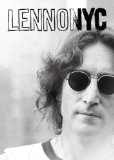| Reviews & Columns |
|
Reviews DVD TV on DVD Blu-ray 4K UHD International DVDs In Theaters Reviews by Studio Video Games Features Collector Series DVDs Easter Egg Database Interviews DVD Talk Radio Feature Articles Columns Anime Talk DVD Savant Horror DVDs The M.O.D. Squad Art House HD Talk Silent DVD
|
DVD Talk Forum |
|
|
| Resources |
|
DVD Price Search Customer Service #'s RCE Info Links |
|
Columns
|
|
|
LennonNYC
In the thirty years since his untimely death, there has been no shortage of documentaries and docudramas concerning John Lennon, and as a diehard Lennon and Beatles fan, I've seen them all. So it is with some surprise that I found the American Masters portrait LennonNYC so fresh and inspired; it takes a new angle on its subject, and paints its picture of him with a wealth of rare material and seldom-told tales from lesser-known sources.
Director Michael Epstein (who helmed the Oscar-nominated Battle Over Citizen Kane) wisely keeps his focus tight, zooming in on the last decade of the artist's life--creating, if you will, a love song about Lennon's romance with New York City. Epstein begins the film in 1971 (thankfully assuming that we all know who Lennon is, and sparing us the thumbnail Beatles bio), as Lennon and wife Yoko Ono move to New York from London and nest in a small apartment in Greenwich Village. Via extensive documentary footage and photos, Epstein creates a vivid portrait of the city at that time, and of that moment in the counter-culture.
As we now know, Lennon's interactions with said counter-culture--his anti-war protests and increasingly political songwriting--made him a target of the FBI, which put him under surveillance, and the INS, which targeted him for deportation. Those battles were examined in the 2006 documentary The U.S. vs. John Lennon, but that film was a shallow, flashy affair; in spite of the broader scope of this film, it delves into those investigations with greater detail and depth.
Much of that is due to Epstein's regard of Lennon first as a man, then as an artist and activist. He doesn't feel like the abstract entity that some of the worshipful documentaries have positioned him as. There is some painfully personal stuff here, like the story of the embarrassing display at a party that prompted his separation from Yoko; we're shown a series of photographs taken the morning after, and they're loaded with subtext. The vivid, first-person accounts of the subsequent "lost weekend" in Los Angeles are similarly candid and unvarnished.
This is not to imply that the film soft-sells Lennon's musical growth in the period. It creates a tangible picture of the artist at work, cleverly marrying studio chatter and outtakes with photos and complimentary animations, intercut with interviews of his fellow musicians and technicians. These are not the usual talking heads in a Lennon bio-doc, but they have plenty to add to the conversation; there's a great story about why he tuned his guitar as he did, and fascinating illustrations of his songwriting process, vividly comparing and contrasting his original demos and the final product. The animators ingeniously frazzle the animation with on-screen text to convey the chaos of the out-of-control Rock and Roll sessions, and the film articulates with clarity why that project went wrong, and why the next one (Walls and Bridges) went so right.
The music is, of course, tremendous--it's great to see that footage from the One to One concert at Madison Square Garden (how's about we get that show out on DVD?)--and the tapes are, in places, astonishing. The home audio tape of young Sean Lennon singing "With a Little Help to My Friends" to his daddy is a bit overwhelming, but nothing matches the studio tape of John in the studio, having Yoko put the phone up to the monitor so he can say good night to his boy. It just breaks your heart. Epstein knows that we know the end of the story, and handles Lennon's death tastefully but chillingly--a fade to black, the wail of a police siren. In the quiet, stark handling of that moment, Epstein manages to capture both the pain and inexplicability of his sudden, too-soon demise.
THE DVD: Video:
The film's anamorphic widescreen presentation is strong, not only with regard to the new interviews (which are crisp and well-rendered, with fine saturation and no artifacting) but the archival materials, which look quite good as well. Sure, there's the occasional scratchy clip, but most maintain a clean, undistracting quality, and the still photos look terrific (particularly the sharp black and white images).
Audio:The 5.1 surround mix is surprisingly active, at least by documentary standards, with the almost non-stop music full and immersive throughout the surround channels, and interview audio nicely balanced in the center. The songs sound great--the full, dirty sound of "Cold Turkey" is delicious, and the hefty bass of "(Just Like) Starting Over" give the LFE channel some real weight. Some of the demo recordings are a little hissy, but that's to be expected, considering the source.
A 2.0 stereo track is also available.
Extras:None. Boo.
FINAL THOUGHTS:In choosing to hone in on John Lennon's years in New York City, a place where he felt he could be his best self, LennonNYC somehow pulls of the neat trick of being both incomplete and comprehensive. There wouldn't seem to be much new to learn or say about the iconic musician, but the film's personal approach and cinematic fluidity makes for unexpectedly essential viewing.
Jason lives in New York. He holds an MA in Cultural Reporting and Criticism from NYU.
|
| Popular Reviews |
| Sponsored Links |
|
|
| Sponsored Links |
|
|
| Release List | Reviews | Shop | Newsletter | Forum | DVD Giveaways | Blu-Ray | Advertise |
|
Copyright 2024 DVDTalk.com All Rights Reserved. Legal Info, Privacy Policy, Terms of Use,
Manage Preferences,
Your Privacy Choices | |||||||













